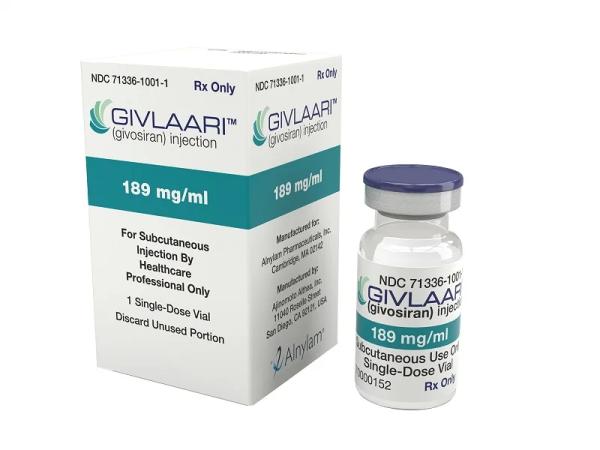Givosiran Side Effects
Medically reviewed by Drugs.com. Last updated on Aug 13, 2023.
Applies to givosiran: subcutaneous solution.
Serious side effects of Givosiran
Along with its needed effects, givosiran may cause some unwanted effects. Although not all of these side effects may occur, if they do occur they may need medical attention.
Check with your doctor or nurse immediately if any of the following side effects occur while taking givosiran:
More common
- Agitation
- blood in the urine
- coma
- confusion
- dark urine
- decreased urine output
- depression
- dizziness
- headache
- irritability
- lethargy
- loss of appetite
- muscle twitching
- nausea or vomiting
- rapid weight gain
- seizures
- stomach pain
- stupor
- swelling of the face, ankles, or hands
- unusual tiredness or weakness
- yellow eyes or skin
Rare
- Chest tightness
- cough
- difficulty swallowing
- dizziness
- fast heartbeat
- hives, itching, or skin rash
- puffiness or swelling of the eyelids or around the eyes, face, lips, or tongue
- trouble breathing
Other side effects of Givosiran
Some side effects of givosiran may occur that usually do not need medical attention. These side effects may go away during treatment as your body adjusts to the medicine. Also, your health care professional may be able to tell you about ways to prevent or reduce some of these side effects.
Check with your health care professional if any of the following side effects continue or are bothersome or if you have any questions about them:
More common
- Bleeding, blistering, burning, coldness, discoloration of the skin, feeling of pressure, hives, infection, inflammation, itching, lumps, numbness, pain, rash, redness, scarring, soreness, stinging, swelling, tenderness, tingling, ulceration, or warmth at the injection site
For Healthcare Professionals
Applies to givosiran: subcutaneous solution.
General
The most commonly reported adverse reactions included nausea and injection site reactions.[Ref]
Hypersensitivity
Uncommon (0.1% to 1%): Anaphylactic reaction, hypersensitivity
In clinical trials, 1 patient experienced an anaphylactic reaction and 1 patient experienced a hypersensitivity reaction.
Hepatic
Very common (10% or more): Transaminase elevations (13%)
Renal
Very common (10% or more): Increase serum creatinine (15%; includes blood creatinine increased, glomerular filtration rate decreased, chronic kidney disease [decreased eGFR])
Local
Very common (10% or more): Injection site reactions (25%)
Gastrointestinal
Very common (10% or more): Nausea (27%)
Dermatologic
Very common (10% or more): Rash (17%; includes pruritus, eczema, erythema, rash, pruritic rash, urticaria)
Immunologic
As with all oligonucleotides, there is a potential for immunogenicity. The detection of antibody formation is highly dependent on the sensitivity and specificity of the assay and therefore comparison of antibody incidence is misleading. In placebo-controlled and open-label clinical studies, 1 of 111 patients with acute hepatic porphyria (AHP;0.9%) developed treatment-emergent anti-drug antibodies (ADA) during treatment. No clinically significant differences in the clinical efficacy, safety, pharmacokinetic, or pharmacodynamic were observed in the patients who tested positive for ADA.
Uncommon (0.1% to 1%): Treatment emergent anti-drug antibodies
Other
Very common (10% or more): Fatigue (10%)
More about givosiran
- Check interactions
- Compare alternatives
- Dosage information
- During pregnancy
- Drug class: miscellaneous metabolic agents
- En español
Patient resources
Other brands
Professional resources
Other brands
Related treatment guides
References
1. Product Information. Givlaari (givosiran). Alnylam Pharmaceuticals. 2019.
Further information
Always consult your healthcare provider to ensure the information displayed on this page applies to your personal circumstances.
Some side effects may not be reported. You may report them to the FDA.

